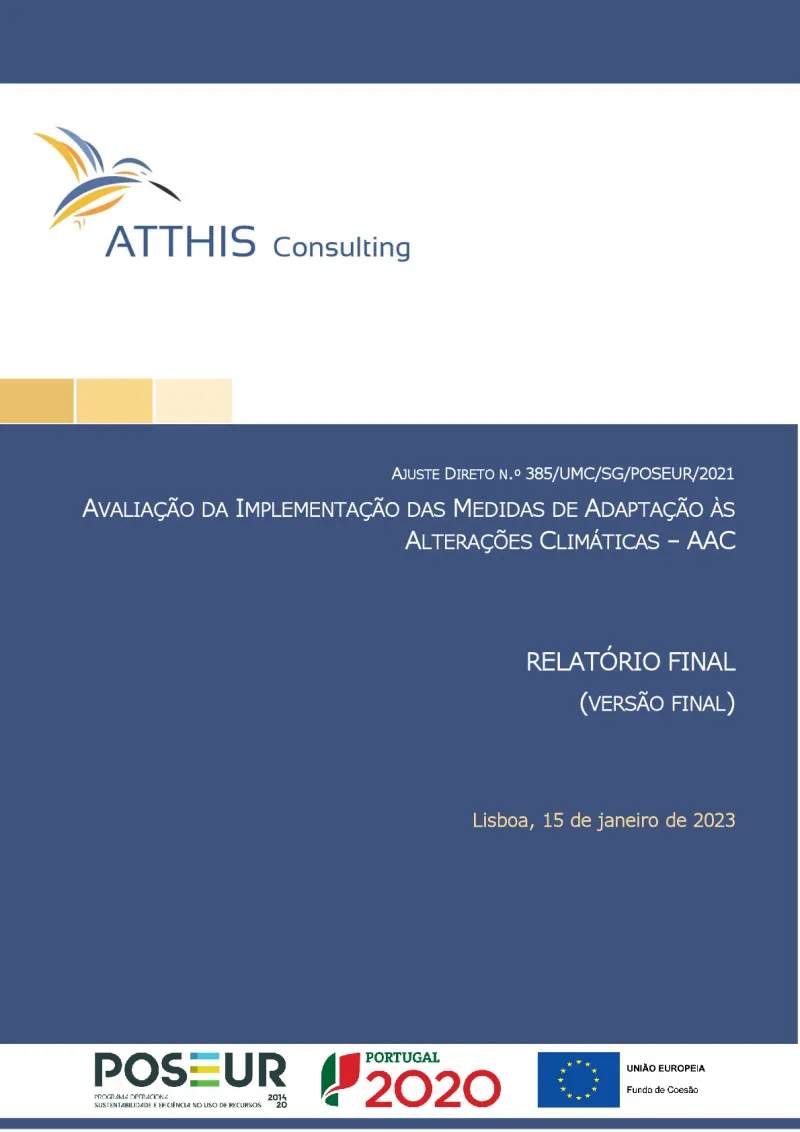Evaluation of the implementation of climate change adaptation measures
The report assesses the contribution of climate change adaptation interventions financed by European Structural and Investment (ESI) Funds to reduce the threats of climate change in Portugal.
- Portugal
- Programming period: 2014-2022
- Environmental impacts


This document constitutes the final report of the 'Assessment of the Implementation of Adaptation Measures to Climate Change', produced in 2023 and covering 2014-2021.
This report aims to identify how ESI-financed climate change adaptation interventions have reduced Portugal's climate change threats. The interventions under assessment integrate six programs: POSEUR, PO MAR 2020, PO Açores, PDR 2020, PRODERAM 2020, and PRORURAL+.
The assessment focused on a set of dimensions (relevance/coherence, effectiveness, efficiency, impact/sustainability, and European Added Value (EAV)) that were conveyed in the preparation of the response to each assessment question (QA).
The methodological approach developed centred on establishing the logical framework (i.e. the theory of change) underlying the implementation of climate change adaptation measures and allocating the different assessment dimensions to segments of this logical framework. This exercise made it possible to structure the objectives of the evaluation and, in particular, systematise the chain of effects. This also allowed for the evaluation dimensions to be developed along the chain of effects, identify information needs and select the information-gathering techniques best suited to each segment of the chain of effects to be investigated/evaluated. Information sources included the collection and analysis of documents, statistics, semi-structured interviews and surveys of project promotors.
The report does not have a specific section dealing with limitations or constraints. Very few were explicitly identified throughout the document:
- Limited number of indicators for the analysis of efficiency (cost-effectiveness);
- Information on projects not always complete.
The assessment concludes with median levels of relevance and coherence of the set of ESI-funded interventions and the objective of the evaluation. Results show that 9% of the operations objectives of the assessment had very limited (i.e. less than 25%) to no execution in the period on which the evaluation focuses. The set of intervention objectives of the assessment contributes to nine out of the fifteen indicators provided in the P3AC (Portuguese Action Program for Adaptation to Climate Change). Still, its operationalisation only allowed the achievement (or overachievement) of four out of the fifteen targets of this programme.
In terms of efficiency, the three different approaches used indicated different results. The impact of a significant set of interventions (equivalent to around 50% of the financial envelope subject to the assessment) is high regarding climate change adaptation. The ESI funds made a difference by expanding the base of financing resources that, in its absence,e would be mobilised at the national level (private and public) and by increasing the relevance of intervention areas that tend to have, in the absence of ESI funds, a limited expression in the global context of climate change adaptation in Portugal.
Author(s)
ATTHIS CONSULTING | Ambiente e Economia dos Recursos Naturais: Cristina Marta-Pedroso, Lia Laporta, Gisela Ferreira, Rita Lopes, João Gouveia